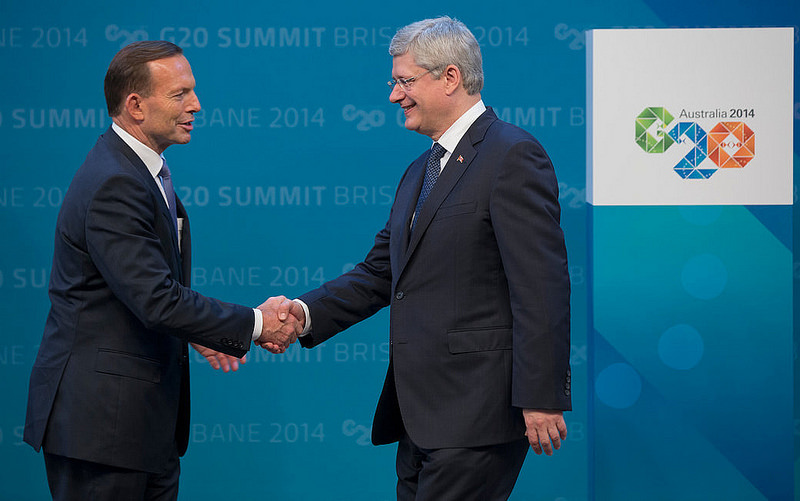When the G20 meetings in Brisbane, Australia broke up last weekend, the usual “time to manage the news” approach of the host government ran into some serious difficulties.
Supremely unpopular at home, instead of massaging international public opinion in the hopes of improving his domestic image, the Australian Prime Minister Tony Abbott seemed intent on gaining ground in the world’s unloved leader sweepstakes.
Abbott had wanted to keep carbon reduction off the November 15-16 G20 agenda, and to have leaders focus on increasing production, not controlling levels of carbon dioxide in the atmosphere. Unfortunately for Abbott, China and the U.S. had signed a breakthrough climate change accord at the APEC summit which preceded the G20.
Abbott took it on the chin as host of the G20 for his neglect of the defining issue of our times. Meanwhile he was trying to garner approval for a right-wing agenda focused on raising economic growth, a doubtful objective without a green orientation.
Observers wanted to know how Abbott could ask the G20 to focus on labour market reforms and other leftovers from the “structural adjustment” agenda of the Thatcher-Reagan era? Surely, the news focus was what the Australian summit had to say now that the two major economies in the world have finally agreed to tackle climate change?
In his televised remarks to the assembled leaders as chair of the gathering, Abbott had trumpeted his killing of the Australian carbon tax introduced by the previous Labour government.
Overall, cheap shots at former governments are not the way to demonstrate diplomatic aplomb. Specifically, when speaking to leaders of other countries, it is expected that host governments show some appreciation for those leaders with climate change agendas, and not deprecate efforts made to address it.
For those reporting on summit policy measures, the Australian government approach to climate change — one step short of denial — raised questions about the sanity of its first minister. Not the sort of headline the Australian government press secretaries were looking to read after the G20 summit.
On reduction of green house gas emissions, like much else, Abbott is a soulmate of Stephen Harper. In Australia, as in Canada, funds for scientific funding of environmental research have disappeared. The renewable energy agency was abolished by the first budget of the Abbott government.
It was not just the urging of Stephen Harper that prompted the Abbott government to reintroduce discredited economic policy at the Brisbane G20. One month prior to the November summit, Robert Murdoch, the king of English language media worldwide had been invited by the Australian Treasurer to address the G20 Finance Ministers’ meeting in Washington.
Murdoch, like Abbott and his government, is a big fan of austerity, cutbacks to government social support, de-regulation, and tax cuts, and that was the message he delivered. It was the same advice G20 Finance Ministers had been following for years, with predictable sorry results.
Whether it is called secular stagnation, or deflation, or an unemployment crisis, or a failure of capitalism, the current economic reality is the same across the wealthy countries.
Increasing inequalities, slow to no growth, and disregard for alternative approaches characterize the economic situation. Much of importance to electorates is not being addressed by governments. Reducing economic policy to less government, more business mantras is making things worse, not helping.
Murdoch appeared at the Business Summit or B20 (which is a part of a set of parallel meetings to the G20) to offer his economic message for the assembled overly paid Chief Executives.
The B20 has given itself the mandate of setting the agenda and policy choices for the G20 political leaders, and B20 priorities are the ones reflected in the main policy messages of the G20 final communiqué.
Drawing attention away from the political role played by big business is part of normal media coverage, but news still happens, and media like to cover it.
When Tony Abbott got up to proclaim the issue facing the world was not climate change, but restoring economic growth, his attempt to misdirect attention did not work.
The China-U.S. climate deal is news, and as such it demands comment and analysis. Asking the G20 to re-run Thatcher-Reagan economic policy was not about to grab the attention of a worldwide audience, otherwise open to hear what the two big economic powers’ agreement on climate change would mean for them, for the world economy, and for the planet.
Duncan Cameron is the president of rabble.ca and writes a weekly column on politics and current affairs.
Photo: pmwebphotos/flickr



